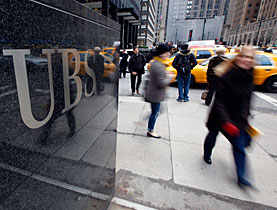
US demands UBS comply in tax evasion case

The United States is to continue its lawsuit against Switzerland's largest bank, UBS, to try to force it to identify thousands of US clients with confidential UBS accounts.
The Justice Department said in a brief filed with a Miami court on Tuesday that it was pressing ahead with its case to reveal information about 52,000 Americans suspected of using the bank to hide nearly $15 billion (SFr16.3 billion) in assets and evade US taxes.
It rejected arguments from UBS and the Swiss government that had tried to have the case dismissed. A court hearing is scheduled for July 13.
Despite media speculation about a possible settlement of the five-month-old case, the Justice Department said it was seeking to enforce tax compliance with the full weight of US law.
“The United States has a strong national interest in making sure that all US taxpayers comply with the tax laws, including disclosing their offshore accounts, and paying all the taxes they owe,” the department said in the brief.
“Enforcement”
“The United States has proven its case for enforcement. The court should order UBS to comply in full,” it added.
UBS has consistently said that enforcement of the US summons would require the bank to violate Swiss legislation on banking secrecy and was inconsistent with US-Swiss treaties.
The Swiss authorities have also said the US case violated the sovereignty of another state and should therefore not be pursued.
UBS spokeswoman Karina Byrne said the bank was “open to an appropriate solution” to avoid going to court, but said no settlement had yet been reached.
Both lawyers and analysts have been sceptical about reports that the US would drop the case against UBS without major Swiss concessions, in view of the current momentum against tax havens.
“Based on our representation of many UBS cases, it is clear in our minds that the government is going to pursue vigorously its objectives of transparency and limiting tax haven abuse,” lawyer William Sharp, who represents US clients of UBS told the Reuters news agency.
Legal treaties
UBS and Bern have argued that any exchange of information should be handled through existing legal treaties rather than in the courts.
But the Justice Department has appeared unrelenting.
“Although Swiss interests in bank secrecy may also be important, the court must consider those interests in the context of UBS’s conduct, where for at least seven years the bank actively helped tens of thousands of Americans break US laws and evade hundreds of millions of dollars in US taxes,” the department said.
“The vital national interest of the United States in fighting attempts by US taxpayers to avoid and evade their tax obligations outweighs the general Swiss interest in maintaining the secrecy of its banking relationships, especially for those foreign lawbreakers,” it added.
In its brief, the Justice Department said that UBS had acknowledged that its bankers committed “very serious crimes on US soil” and had therefore subjected the bank to the full jurisdiction of US law.
“Swiss banking secrecy is not an impenetrable wall,” the document said.
Disappointed bankers
In a position paper on the case on Wednesday, the Swiss Bankers Association (SBA) said it was “disappointed” that the US government had failed to address specific arguments delivered by the SBA and other organisations in a brief delivered in May.
The brief had argued that when the US and another country entered a treaty that established an agreed process for obtaining administrative assisstance in tax matters, the treaty process should be honoured, particularly if the alternative was, as in the present case, to impose US law on a Swiss bank in a way that would require the bank to violate Swiss law.
The SBA said it continued to believe the dispute should be resolved through government-to-government negotiations and not through litigation.
In another reaction, Swiss Finance Minister Hans-Rudolf Merz said the US decision to pursue the case came as no surprise. However, he told journalists in Bern that he did not rule out an out-of-court settlement between the parties.
swissinfo.ch and agencies
Switzerland announced on June 19 that it had signed a double-taxation agreement with the United States.
Details of the accord will not be made public before it has been signed at the ministerial level in both countries. It will also need the backing of the Swiss cantons.
Once approved, Switzerland will cooperate with US tax authorities in investigating suspected cases of tax evasion. Under the earlier agreement, Switzerland only cooperated in cases of fraud.
The US Treasury officials hailed the agreement as the result of “aggressive efforts” to do away with offshore tax evasion.
On May 14, 2008, former UBS employee Bradley Birkenfeld and a Liechtenstein businessman were charged by the US authorities with helping an American billionaire avoid paying taxes on $200 million of assets deposited in Swiss and Liechtenstein bank accounts.
Birkenfeld turned whistleblower, giving details of UBS private banking practices to US prosecutors.
In July, a Miami court authorised the Internal Revenue Service to issue a summons on UBS demanding the release of confidential information on clients the agency suspected of tax evasion.
In the same month, UBS told a congressional hearing that it would stop offshore banking activities for US clients.
UBS agreed to pay $780 million and name some United States clients to resolve criminal fraud charges against it.

In compliance with the JTI standards
More: SWI swissinfo.ch certified by the Journalism Trust Initiative

























You can find an overview of ongoing debates with our journalists here . Please join us!
If you want to start a conversation about a topic raised in this article or want to report factual errors, email us at english@swissinfo.ch.